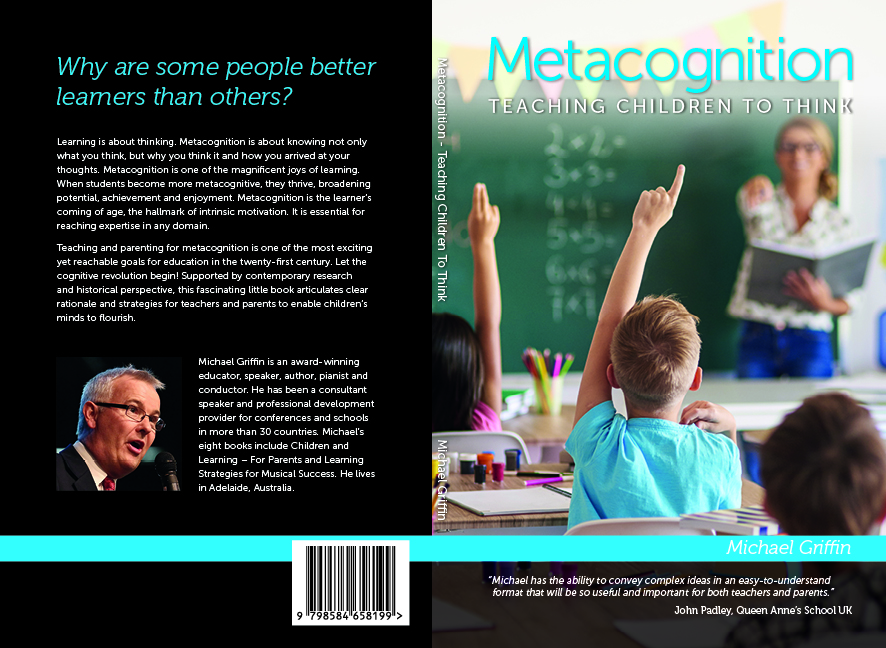Metacognition: Teaching Children To Think – Book Review

PUBLISHED IN RITMICO NZ, JOURNAL 114, OCT 2021
One aim most of us share in our teaching is for our students to become more autonomous learners who are adept at practising intelligently, monitoring their progress, and eventually becoming lifelong musicians capable of making music independently. The capability to monitor one’s own thinking and to reflect on effective ways of learning is known in the academic literature as metacognition. Often described as the process of ‘thinking about thinking’, metacognition has become an important concept in the area of learning how to learn which is now considered by many educators to be just as important as what we learn (that is a big debate!). Michael Griffin is a prolific writer and this year he has added to his output a very useful and easy to read book all about metacognition for the music teaching and learning context.
Michael Griffin lays out the central problem for teachers very nicely in the introduction – the tension between encouragement that is too vague (“well done, good work!”) and the need for specific feedback about exactly what a student needs to do to improve that doesn’t lead to them being incapable of thinking for themselves. The answer is that our encouraging remarks (in the academic literature sometimes known as evaluative feedback) need to be directly related to very specific goals. “Well done” – for what exactly? Detailed and specific feedback is called descriptive.
Intertwined with these two types of feedback is the need for students to be able to monitor their practice in the six days between lessons, and to be able to motivate themselves intrinsically in that process. The book introduces some key concepts and strategies for how teachers might make this possible for their students. As Michael Griffin suggests, metacognition is a vital part of our role as learners, as “through reflection and evaluation, we understand our actions more critically and have a vision for self-improvement. We improve our learning by continually designing and redesigning our training” (pg 9). This applies to us as teachers as much as to our students!
In the book, Michael Griffin first defines metacognition and then looks more specifically at a number of significant related concepts (eg self-determination theory, curiosity) and pedagogical techniques for its development, such as thinking carefully about the types of questions we ask, being aware of the ‘wait time’ and prompts, and the importance of verbalisation and writing in the development of intelligent thinking. Interestingly, Michael Griffin moves the book toward the more abstract goal of flow – that ‘peak’ state where we are so absorbed in an activity that we “lose self-awareness and a sense of time” (pg 85). His argument is that metacognition can ultimately lead to states of flow where “the pure pleasure of the activity is what motivates” (pg 85). The author also draws our attention to Vygotsky’s famous ‘zone of proximal development’ – that space where the right balance between challenge and attainment for our students is found by the expert teacher. Authentic motivation is the outcome where students become active participants in their learning trajectories.
There is much to enjoy in this book which ranges from the philosophical to the practical, draws on academic literature and is presented in an easy to read, very accessible style. Highly recommended.
Dr Graham McPhail MMus BMus (Hons) Dip Tchg TTC AIRMT is a senior lecturer in the School of Curriculum and Pedagogy, in the Faculty of Education and Social Work at the University of Auckland, NZ.
Written for RITMICO, Journal 114 of the Institute of Registered Music Teachers of New Zealand. October 2021.
MICHAEL GRIFFIN
M. Ed Studies, B.Ed.
A. Mus. A
Adelaide, South Australia